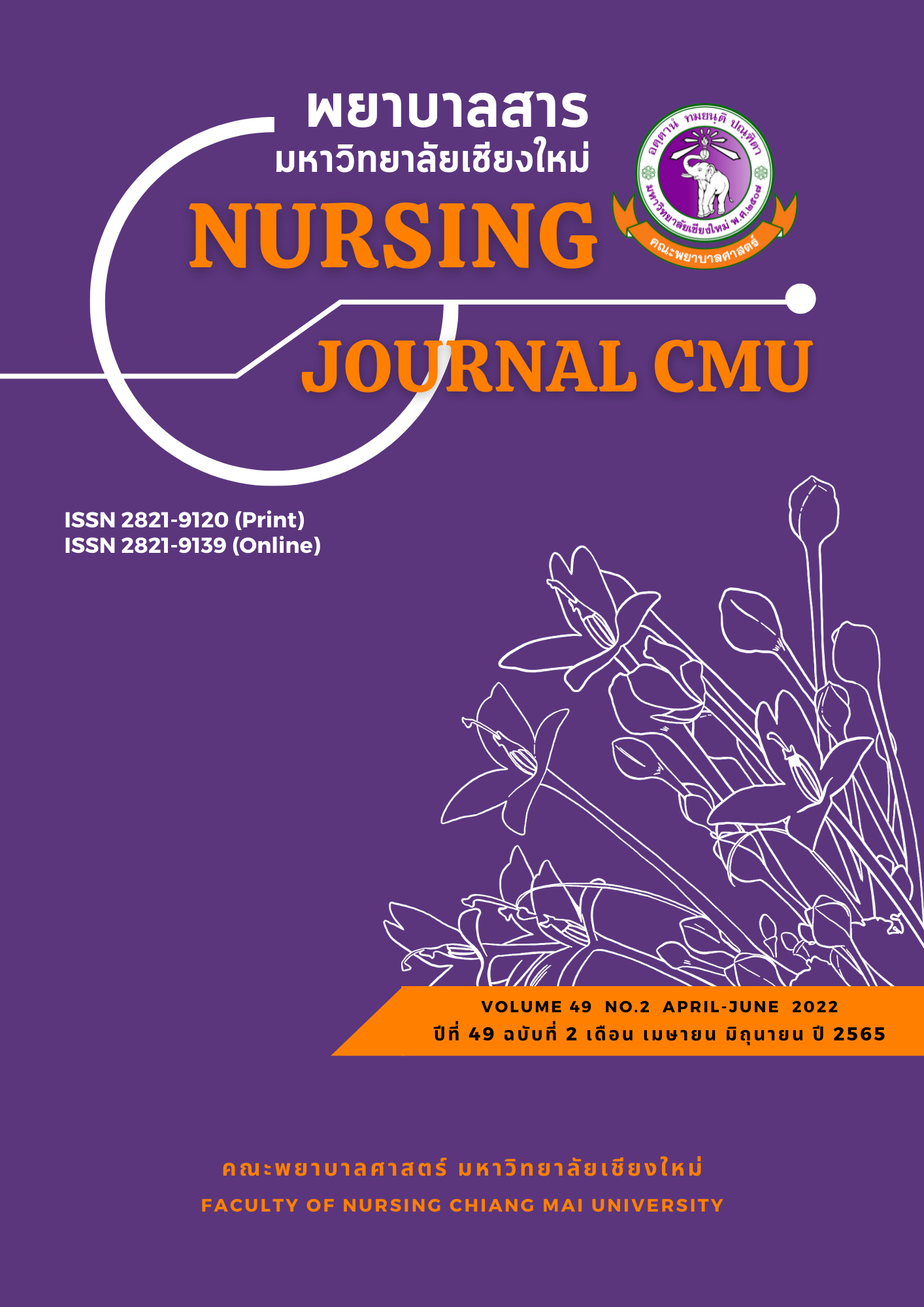การประยุกต์ใช้ทฤษฎีสัมพันธภาพระหว่างบุคคลของเพบพลาวในกระบวนการพยาบาล
คำสำคัญ:
การสร้างสัมพันธภาพ, ทฤษฎีสัมพันธภาพของเพบพลาว, นักศึกษาพยาบาล, กระบวนการพยาบาลบทคัดย่อ
การพยาบาลถือเป็นศาสตร์ที่ต้องอาศัยศิลปะในการรักษาและช่วยเหลือบุคคลที่เจ็บป่วย กระบวนการพยาบาลเป็นลักษณะการทำงานที่มีความเกี่ยวเนื่องสัมพันธ์กันตั้งแต่ต้นจนจบ ต้องใช้เครื่องมือในการให้ได้มาซึ่งความไว้วางใจที่ผู้รับบริการจะกล้าบอกข้อมูลและความวิตกกังวล การฝึกปฏิบัติงานครั้งแรกของนักศึกษาพยาบาลชั้นปีที่ 2 นักศึกษาต้องใช้ทฤษฎีและความรู้ที่เรียนมาประยุกต์สู่การปฏิบัติงาน โดยเฉพาะการเริ่มต้นสร้างสัมพันธภาพกับผู้รับบริการในหอผู้ป่วย ซึ่งเป็นเรื่องใหม่สำหรับนักศึกษาพยาบาลในการมีปฏิสัมพันธ์กับผู้รับบริการในบทบาทของพยาบาล นักศึกษายังขาดประสบการณ์และทักษะในการสื่อสารกับผู้รับบริการในบทบาทของผู้ให้การบริการ การสร้างสัมพันธภาพเป็นเครื่องมือที่นำมาใช้ในการติดต่อสื่อสารเพื่อให้ได้มาซึ่งข้อมูลและนำไปสู่การพยาบาลที่เหมาะสม ทฤษฎีสัมพันธภาพระหว่างบุคคลของเพบพลาวสามารถนำมาประยุกต์ในแต่ละขั้นของกระบวนการพยาบาล อันได้แก่ ระยะเริ่มต้นกับการประเมินสภาพ ระยะระบุปัญหากับการวินิจฉัยการพยาบาลและการวางแผนการพยาบาล ระยะดำเนินการแก้ปัญหากับการปฏิบัติการพยาบาล และระยะปัญหาคลี่คลาย ยุติสัมพันธภาพกับการประเมินผล
ทฤษฎีสัมพันธภาพของเพบพลาว เป็นทฤษฎีที่ให้ความสำคัญในการเคารพความเป็นปัจเจกบุคคลซึ่งกันและกันระหว่างนักศึกษาพยาบาลและผู้รับบริการ และต้องใช้บทบาทที่หลากหลายของพยาบาลในการสร้างสัมพันธภาพกับผู้รับบริการ มุ่งให้ผู้รับบริการตระหนักและเข้าใจปัญหาของตนเองได้อย่างแท้จริง ทั้งนักศึกษาพยาบาลและผู้รับบริการจะเติบโตและพัฒนาตนเองไปพร้อมกัน และนำไปสู่การให้ความร่วมมือในการแก้ปัญหาได้อย่างถูกต้องและเหมาะสม
เอกสารอ้างอิง
Alligood, A. M., & Tomey, A. M. (2010). Nursing theorists and their work (7th ed.). Missouri: Mosby Elsevier.
Choochuen, W. (2019). Application of nursing theory for a student-centered teaching. Journal of Health Research and Innovation, 2(1), 96.
Ganzalo, A. (2021). Hildgard Peplau: Interpersonal relations theory. Retrieved from https://nurselabs.com/hildegard-peplaus-interpersonal-relations-theory.
Hanyoot, O. (2014). Nursing process and Implications. The Journal of The Royal Thai Army Nurses, 15(3), 137-143. (in Thai)
Ibrahim, F. (2008). Nursing Practice according to the nursing theory framework. Bangkok: Samjaroenpanich. (in Thai)
Kaewkangwan, S. (2002). Psychology of life development at all ages. Bangkok: Thammasart University. (in Thai)
Leary, M. (2020). Relational value in relationships. Retrieved from https://www.thegreatcoursesdaily.com/relational-value-in-relationships/
Manikat, W. (2000). Interpersonal relationship and organization commitment of professional nurses Somdej Phra Yuparat Hospital (Master’s thesis). Chiang Mai University, Thailand. (in Thai)
Maslow, A. H. (2019). A theory of human motivation. Retrieved from https://books.google.co.th/books?id=SV2HDwAAQBAJ&printsec=frontcover&dq=maslow%27s+hierarchy+of+needs&hl=th&sa
Namakankham, A., Suwannayos, C., Khawnnguen, P., & Udomkhamsook, W. (2008). Stress and factor’s relationship to stress of student nurse in ward. Nursing Journal, 35(12), 26-36. (in Thai)
Payomyam, S. (2005). Psychology of interpersonal relations. Bangkok: Bangkok-Com Techtrade. (in Thai)
Peplau, H. E. (1991). Interpersona relations in Nursing: A conceptual frame of reference for psychodynamic nursing. New York: Spring Public.
Petiprin, A. (2021). Peplau's theory of interpersonal relattions. Retrieved from https://nursing-theory.org/theories-and-models/peplau-theory-of-interpersonal-relations.php
Pornchaikate au yeong, A. (2016). Psychiatric nursing. Bangkok: Scan Art. (in Thai)
Potter, P. A. & Perry, A. G. (2005). Fundamental of Nursing (6th ed.). St. Louis, MO: Mosby
Senadisai, S. (2015). Fundamentals of nursing. Bangkok: Joodthong. (in Thai)
Sookmak, W. (2014). Communication and Relation for Therapeutic. Maha Sarakham:Kakayia. (in Thai)
Thongpradab, J. (2019). The application of the theory of interpersonal relations to communicate with older adults who suffer from depression. The Red Cross Nursing Journal,12(1), 71-79. (in Thai)
ดาวน์โหลด
เผยแพร่แล้ว
รูปแบบการอ้างอิง
ฉบับ
ประเภทบทความ
สัญญาอนุญาต
ลิขสิทธิ์ (c) 2022 พยาบาลสาร

อนุญาตภายใต้เงื่อนไข Creative Commons Attribution-NonCommercial-NoDerivatives 4.0 International License.
บทความที่ได้รับการตีพิมพ์เป็นลิขสิทธิ์ของวารสารพยาบาลสาร
ข้อความที่ปรากฏในบทความแต่ละเรื่องในวารสารวิชาการเล่มนี้เป็นความคิดเห็นส่วนตัวของผู้เขียนแต่ละท่านไม่เกี่ยวข้องกับมหาวิทยาลัยเชียงใหม่ และคณาจารย์ท่านอื่นๆในมหาวิทยาลัยฯ แต่อย่างใด ความรับผิดชอบองค์ประกอบทั้งหมดของบทความแต่ละเรื่องเป็นของผู้เขียนแต่ละท่าน หากมีความผิดพลาดใด ๆ ผู้เขียนแต่ละท่านจะรับผิดชอบบทความของตนเองแต่ผู้เดียว






